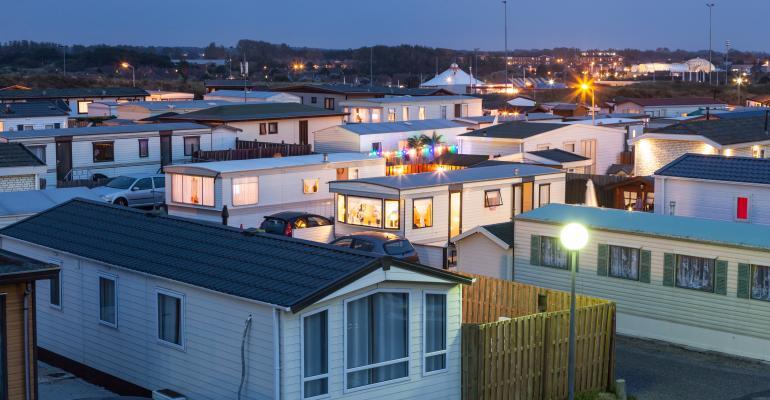Manufactured housing properties are not only surviving the economic crisis created by the spread of the novel coronavirus. By some accounts the sector is thriving compared to other types of real estate.
“Operating fundamentals will likely once-again prove relatively defensive during the current downturn,” according to John Pawlowski, senior analyst, residential for Green Street Advisors, which tracks the performance of several top manufactured housing real estate investment trusts.
Manufactured housing—or “land lease”—properties are still receiving solid rental income from their residents, overall. In the past, manufactured housing properties have performed well in tough economic times. And investors continued to show interest in these properties in the current crisis.
“It appears their collections are not seeing any significant impacts and most are not ready to forecast rent increases,” says Norm Sangalang, senior vice president of manufactured housing for CBRE Capital Markets, based in San Diego, though it is still too early for market-level reports. “Manufactured housing communities have been and will continue to be a strong and diverse business.”
However, manufactured housing communities could suffer from many of the same challenges as conventional apartments. Over the last six weeks, a total of 30 million Americans have filed for unemployment benefits, or nearly 20 percent of the workforce counted in February’s payroll employment report. That number includes many people who live in land lease communities, who may now have problems keeping up with their rent. Many federal, state and local officials have created moratoriums on evictions in a patchwork of jurisdictions, including many of the largest cities in the U.S.
The owners and managers of land lease properties are responding by offering residents who are unable to pay their full rent a variety of payment plans. “Each community is approaching a payment plan that is unique to that market,” says Sangalang.
Strong under pressure
Manufactured housing is less likely than other types of real estate to rise or fall depending on how many jobs are getting produced or destroyed in the broader U.S. economy, according to an analysis by Green Street.
Within the last few years, some of the world’s largest private equity firms, and institutional investors, with more than $1.77 trillion in assets, have made investments in manufactured home communities across the U.S., according to a report by the Private Equity Stakeholder Project, MHAction and Americans for Financial Reform Education Fund.
There are some estimated 50,000 land lease communities of all sizes in the United States. Of these communities, a majority are properties comprised of 100 or fewer rental home sites, and a minority are properties with 100 or more rental home sites. The larger properties, consisting of 100 or more sites, are already widely owned by the 500 known major players.
For example, in mid-2018, the Blackstone Group bought a portfolio of manufactured home communities from Tricon Capital Group. Tricon reported that month the sale of 14 manufactured housing communities for an estimated $172 million.
In 2017, private equity firm Apollo Group management bought Inspire Communities, a manufactured home community operator with 13,000 home sites.
“These properties have a longer duration of residents with an almost completely static level of rental inventory,” says CBRE’s Sangalang. “In many markets, there has been little or no new construction—which combines to create an asset that is intrinsically less volatile.”
However, some parts of the manufactured housing business are more sensitive than others. “Age-restricted manufactured housing represents one of the least economically sensitive parts of the business (rent dependent on social security income / and retirement savings), while transient RVs are the least defensive,” according to Green Street.
“The transient and seasonal RV business are expected to see atypically large declines in cash flows this year as shelter-in-place ordinances and camp park closures prompt cancellations of spring and summer vacations,” according to Green Street’s Pawlowski. Green Street is predicting a “Memorial Day Meltdown” for these sectors.
Overall, however, land lease communities have some natural protection from the particular problems created by the coronavirus.
“The nature of standalone housing units, with separated lot sites, provides a built-in physical distancing aspect that reduces the need for extensive operational changes,” says CBRE’s Sangalang. However, like other property types, many land lease communities have closed or reduced access to common areas and amenities.
Buyers still buying manufactured housing
Manufactured housing communities are still attracting investors – and deals are still getting done. “CBRE has sold two parks in the past two months and neither had any COVID-19 related changes in price or terms,” says Sangalang.
However, the crisis caused by the spread of the coronavirus is slowing investors down. “There have been fewer transactions due to the restrictions created by the stay at home orders, with many postponed until that is lifted,” he says.
Also, so far the capital markets have been relatively kind to the manufactured business so far in the coronavirus crisis. “The lending markets for communities and fundamentals have not seen any major indications of change so far,” says Sangalang. “Movement and business restrictions will likely result in a lower number of overall transactions in 2020.”

